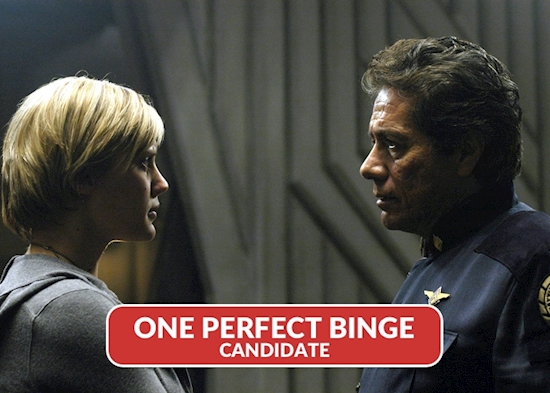'Battlestar Galactica' is a Bingeable Feast Eager to Bust Your Gut
This article is part of our One Perfect Binge bracket project. Follow along with here for updates, and on Twitter, keep tabs via #OnePerfectBinge.
If you can’t do any more Star Trek, then you might as well do some Star Wars, and if you can’t do any Star Wars, then you might as well tackle its finest, cheesiest, rip-off – Battlestar Galactica. The original television series was rushed into production after George Lucas‘ success, and 20th Century Fox did not take kindly to Universal Studios’ ravenous enthusiasm. In 1978, Fox sued Universal for plagiarism, indicating 34 specific instances where Battlestar Galactica pillaged from Star Wars. Universal countersued, claiming Fox stole from their cheapie sci-fi classic Silent Running as well as the Buck Rogers serials from the 30s. The studios eventually settled out of court, but come on, Star Wars is far from a sourceless creation, and what’s good for the goose is good for the gander.
Twenty-six years after Battlestar Galactica roared outta the galaxy far, far away, Moore retooled the core concept and made the 70s goofball action series work for his needs. Twelve human colonies are decimated by a Cylon attack. The androids have warred with the colonies in the past, but this time they’re hoping to erase the biologicals from existence.
The leftover humans pile into the Battlestar Galactica and flee across the cosmos, looking for a new home. With limited resources and a growing paranoia that the Cylons have invaded their ranks disguised as biologicals, Colonial Fleet officer William “Bill” Adama (Edward James Olmos) attempts to maintain order, hope, and the damn species, while also battling constant Cylon attacks, internal strife, and a crumbling morality. Most of what Moore infuses into his series can be found in the original, but coming out of DS9, he leans way harder into the possible brutality of end times.
9/11 changed everything, but mainstream audiences mostly ignored criticisms surrounding the blind patriotic fallout in favor of “by-any-means-necessary” fiction a la 24. Where Star Trek had gone before, Battlestar Galactica could go in the early aughts (granted, Star Trek: Enterprise attempted to have a conversation with post-9/11 America, but its third season Xindi war simply pale in comparison). In space, only the most willfully ignorant could not hear Ronald D. Moore scream.
Aboard the Galactica, Adama constantly battled against issues of terrorism complete with suicide bombings (humans against Cylons), torture, and the suppression of civil liberties. With humanity on the brink of extinction, what does it matter if we achieve survival ethically? It’s them or us—damn civility.
When watching Battlestar Galactica, you can’t help but place yourself on the bridge or in the cockpits. Where would you draw the line? How does one life weigh against any other? Star Trek II: The Wrath of Khan taught us that the needs of the many outweigh the needs of the few. Star Trek III: The Search for Spocktaught us that the needs of the few should outweigh the needs of the many. Battlestar Galactica taught us the needs of the many, and the needs of the few might be for naught. Choice itself is a privilege.
Battlestar Galactica is not a good guy vs. bad guy proposition. There is an alternate version of the series which looks much more like the original series. Humans vs. Cylons – a battle to the death. Boring. Been there, done that. Who cares? Not me.
Moore is way smarter and nastier than to settle for the usual science-fiction television pap. The Cylons are people too. They have desires, they have dreams, and they have religion. Moore’s Battlestar Galactica often plants you inside the thought process of the supposed villains, and the audience finds itself empathizing with these traditional sci-fi killers. If we have a right to life, so do they.
The Cylons are perfectly capable of following in our footsteps of failure, making the same mistakes, and revealing the nobility of our struggle through their own. Failure is not an option; it’s a requirement. Failure is an education, and Battlestar Galactica celebrates the most wretched mistakes humanity is capable of achieving. No character is more worthy than another (well, ok, there is some real scum present). While we wince at decisions perpetuating atrocity, we also recognize their choices in our history and our present.
Each episode of Battlestar Galactica hits the gut and comes packed with plenty of follow-through. We know this universe. It’s ours. The series is not date-night material or disposable popcorn fodder—Moore deals in meat. Every bite is a meal, and absolutely satisfying, and as such, you’re stuffing your face when you should be full. This binge hurts. Hurts so good.
As the most recent season of HBO’s Watchmen, Battlestar Galactica is a series that should not have worked and had a lot of naysayers ready to take it down before it even launched. It’s based on a previous intellectual property that made its mark in its day but eventually faded from relevancy. Ronald D. Moore saw the potential to say more than “Pew Pew” and unloaded upon us a whole heap of his anxieties regarding American culture and its impact on the rest of the world.
Battlestar Galactica is science-fiction built on the backs of what came before. Yes, on the backs of Ray Bradbury, Harlan Ellison, and Isaac Asimov, but also on the backs of Karl Rove, Dick Cheney, and George W. Bush. Audiences demanding cheap escapism don’t deserve it. You wanted Cylons, here ya go jerks. Deal with it.
Source: filmschoolrejects.com

